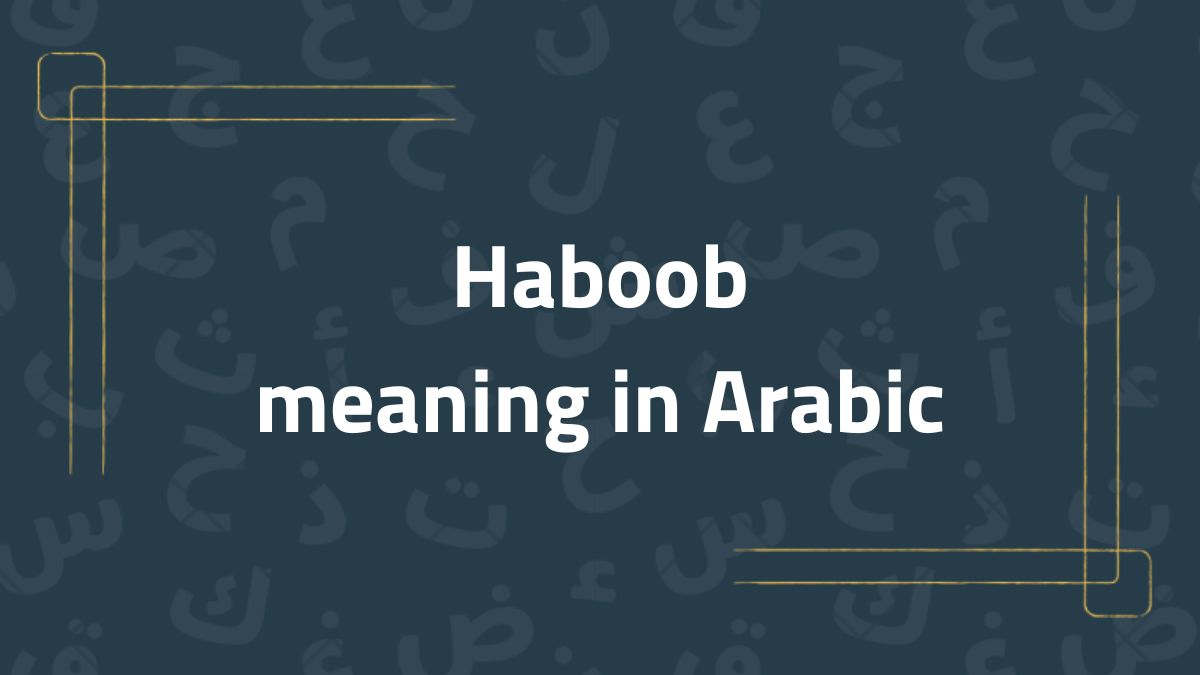The Word "Haboob" Meaning in Arabic With Examples

The Arabic word “haboob” (هَبوب) refers to a strong, violent wind often carrying dust or sand. It describes a specific type of dust storm common in arid regions like the Middle East and North Africa. This article explains the meaning of “haboob,” its linguistic roots, usage in sentences, and cultural significance.
The Meaning of “Haboob” in Arabic
“Haboob” translates to “strong wind” or “violent dust storm” in English. The word comes from the Arabic root “ه-ب-ب” (h-b-b), which relates to blowing or moving forcefully. In Arabic, “haboob” specifically refers to a severe sandstorm with powerful winds that reduce visibility.
The pronunciation is “ha-boob,” with emphasis on the first syllable.
Linguistic Root and Grammatical Usage
The root letters of “haboob” are هـ (h), ب (b), and ب (b). This root appears in different verb forms, such as “هَبَّ” (habba), meaning “to blow” or “to rush.”
Grammatically, “haboob” is a noun and can take different forms based on sentence structure:
-
Definite form: الهَبوب (al-haboob) – “the dust storm”
-
Indefinite form: هَبوب (haboob) – “a dust storm”
Examples of “Haboob” in Arabic Sentences
-
Arabic: جاء الهَبوب فجأةً وأغلقنا النوافذ.
English: The haboob came suddenly, and we closed the windows. -
Arabic: الهَبوب في الصحراء قد يكون خطيرًا.
English: A haboob in the desert can be dangerous. -
Arabic: أثناء الهَبوب، يصعب الرؤية بسبب الغبار.
English: During a haboob, visibility is poor because of the dust.
Cultural or Quranic Significance of “Haboob”
While “haboob” is not directly mentioned in the Quran, similar words like “ريح” (reeh – wind) and “عاصف” (aasif – stormy) describe destructive winds. Dust storms are significant in Arab culture due to their impact on daily life, travel, and agriculture.
Common Misunderstandings or Mistakes
Some learners confuse “haboob” with “عاصفة رملية” (aasifa ramliya), which also means “sandstorm.” While related, “haboob” specifically refers to a sudden, intense dust storm with strong winds. Another similar word is “زوبعة” (zawba’a), meaning “whirlwind.”
Why You Should Learn “Haboob”
Understanding “haboob” helps Arabic learners discuss weather conditions in desert regions. It is useful for travelers, researchers, and those studying Arabic for cultural or religious purposes. Knowing this word improves comprehension of news reports or conversations about natural events in Arab countries.
Conclusion
The word “haboob” in Arabic describes a powerful dust storm common in desert regions. It comes from the root “ه-ب-ب,” meaning blowing wind. This word is important for discussing weather and understanding Arabic culture. Learning “haboob” enhances vocabulary for daily conversations and studies about the Arab world.
By exploring words like “haboob,” learners gain deeper insight into Arabic language and its connection to nature and daily life.
Discover the Quran and Arabic with Shaykhi Academy
We highly recommend Shaykhi Academy for anyone seeking to learn the Quran and Arabic with excellence. The academy is known for combining expert teaching with a compassionate approach, making it a top choice for students worldwide who want to connect deeply with the words of Allah.
At Shaykhi Academy, you’ll find highly qualified teachers who specialize in guiding learners of all ages and levels. Whether you’re just beginning your journey with Arabic letters or aiming to master Tajweed and Quran recitation, their personalized lessons ensure steady progress at your own pace.
With engaging classes, flexible scheduling, and a focus on both spiritual and linguistic growth, Shaykhi Academy makes learning both enjoyable and impactful.
Watch a sample class below to see Shaykhi Academy in action:
Learn Arabic, Quran, And Tajweed With Free Trial!
Make your home a place of faith, understanding, and connection with the Quran. Whether you're starting from scratch or deepening your knowledge, Shaykhi Academy is here to guide you — step by step. ✅ Tailored for all ages ✅ Clear, structured learning ✅ Flexible online sessions ✅ Book your free trial session now!
Learn More
